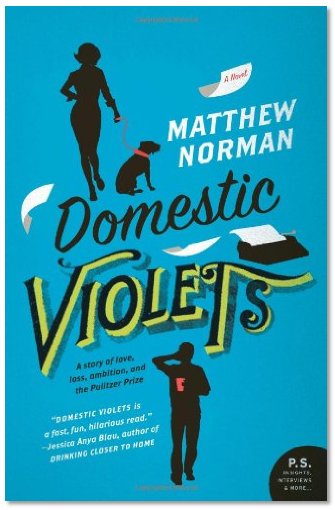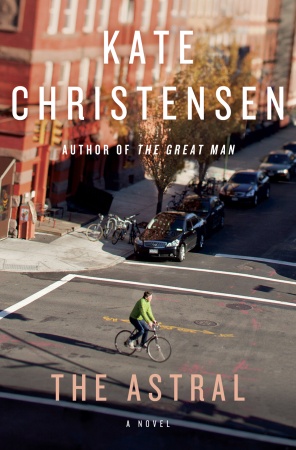 Matt Norman is the author of the amazing, Domestic Violets, just out from Harper Perennial. I am happy to provide you with our most recent conversation:
Matt Norman is the author of the amazing, Domestic Violets, just out from Harper Perennial. I am happy to provide you with our most recent conversation:MN: An afternoon? Are you kidding? Freaking thing took me an entire week.
Actually…all told, it was about two years. I had a completed first draft in about a year. Then the next year was spent fiddling and obsessing. Somewhere along the way, I blew the whole thing up and set it at the beginning of the financial crisis. Of course, it shouldn’t have taken as long as it did, but wives and children and dogs and friends and jobs and television and alcohol and Netflix and televised sports really get in the way of writing.
MN: I think it’s probably a pretty low number, like one or two. I think writing a first draft is the most emotionally agonizing thing you can do to yourself. The “giving birth to a cactus” comparison is dead on. But once I have a beginning, middle, and end, I revel in the process of destroying my own work. I believe that every sentence, particularly if it’s written by me, can be made way, way better.
MN: For the sake of not rambling on and on like a fool, I’ll just talk about Achtung Baby. When it came out, I was a teenager, and I loved it like a kid loves a great album…because it was just so goddamn cool. Along with the music, I really responded to how the band transformed themselves visually and stylistically to fully embody the new material. I’d never really seen a band do that before. They became full-blown rock stars. Over the last twenty years, though, I’ve gained a deeper appreciation for how difficult that album was for them to make. They’d gotten very rich and famous making a very particular kind of music (see The Joshua Tree). But they had the guts and the vision to tear all of that down and give people something that theydidn’t even know they wanted.
I dare you to listen to One in a dimly lit room by yourself and feel nothing. I dare you! (Why am I yelling?)
JR: American Psycho and Domestic Violets were both trade paper originals. I believe the comparison ends there. BUT, do you think a writer’s career is started in trade paper? Less expectations? (this is the serious question of the interview).
MN: Wow, yeah, that officially marks the first American Psycho comparison. Richard Russo’s first novel was a paperback original, too, I believe. Those two guys have done OK, I guess.
When I first sold the book, my agent presented the paperback deal to me as a very positive thing—as a way of making it more accessible to people. That makes sense. You’re asking a lot of readers when you’re asking them to buy your first novel. They have no idea who in the hell you are, and they’re standing there in a bookstore surrounded by authors they already know. So, offering your book in an easier, slightly cheaper form can’t hurt.
And, as you mentioned, from the publisher’s standpoint, I think a paperback original is blessed with more modest expectations, which is good. I’ve found that I’m at my best when people don’t expect a lot from me. My wife can attest to that.
MN: I’d say I shoplift about 75% of the books I read. I can run surprisingly fast for a tall person. But, when I actually do buy a book, I try to hit The Ivy Bookstore—which, for those who don’t know, is a great indie bookstore in Baltimore. My two-year old single-handedly destroys their children’s book department every time she’s there.
I know virtually nothing about business, but my guess is that indie bookstores are going to be OK, particularly in urban areas. The big chains do their thing, and they always will. But indie bookstores are the only places left in the world that are really all about the books—and not just the big sellers either, thank God. So, as long as there are book nerds like us to wander into them, the indies will survive in some form. (He says, hopefully.)
MN: I’m about 50 pages into a new novel now, and, yeah, it has been kind of a bitch. It’s finally going well though, which I’m happy about.
I think the difficulty comes from being reminded, as I said earlier, of how horrible and agonizing first drafts are. By the time your first novel comes out, it exists in your mind as this completed, fully polished thing, and so you fool yourself into thinking that the next one should come out like that, too. Artistic amnesia somehow makes you forget that before your first novel was sitting on the NEW FICTION shelf at a bookstore, it was an aimless train wreck of a Microsoft Word document that kept you up at night wishing you’d gotten a degree in accounting.
Seriously, for book #3, I’m just going to have my team of personal assistants and stylists write it. Seems like that’d be a lot easier.
MN: I wish I was interesting enough to say something totally obscure that no one has ever heard of, but I think The Great Gatsby is it for me. It’s just this absolutely perfect thing. And telling that story through Nick Carraway’s perspective adds a wonderful layer of meaning and commentary. I think about the first line of the book a lot, particularly as it applies to today’s political scene. I’m not going to type it out, though. I don’t want you to get sued by Fitzgerald’s estate…but people should Google it.
As for the worst book…I try to avoid being a hater, at least in public, but I’ll make an exception here. I tend to resist the books that EVERYONE is reading because usually EVERYONE can’t be trusted. But a few years ago I decided to try The Da Vinci Code, just to see what the big deal was. It literally made me angry at society. Well…you know…more angry than usual.







